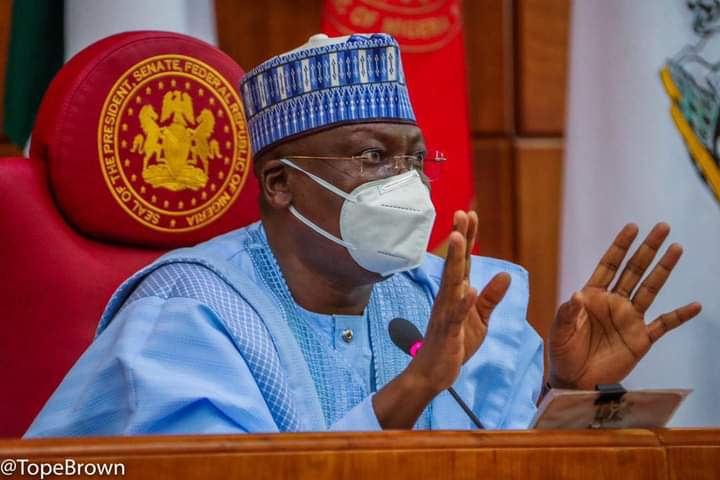Reps raise panel today
APC demands better electoral system, PDP e-transmission
Members of the National Assembly are under intense pressure over the Electoral Act amendment following the commencement of the process to harmonise the two versions of the bills passed by both chambers.
The Senate had last week constituted a seven-member conference committee with the Senate Leader, Abdullahi Yahaya, as chairman to liaise with the House conference panel to harmonise the contentious aspects of the bills passed.
The spokesman of the House of Representatives, Benjamin Kalu, confirmed told Daily Trust that the House will today constitute its conference committee on the Electoral Act Amendment.
The contentious clause
Different versions were passed by both chambers amid sharp divisions among lawmakers over clause 52 of the bill, which seeks the introduction of modern technologies into the electoral process.
Clause 52(3) provides for electronic transmission of results from polling units.
The joint committee on INEC that worked on the bill had recommended that “The commission may transmit results of elections by electronic means where and when practicable”.
But the Senate, during consideration and passage of the bill, changed the section to read “The commission (INEC) may consider electronic transmission provided the national network coverage is adjudged to be adequate and secure by the Nigerian Communications Commission (NCC) and approved by the National Assembly.”
However, the House retained what was recommended by the committee.
Activists, right groups ask panel to adopt House version
The Executive Director, Yiaga Africa, Samson Itodo, advised the harmonisation committee to adopt the House version on the electronic transmission of results.
“We would like to see the House version on the electronic transmission of results which gives INEC the discretion to determine which, when and the technology to be used. The transmission of results should be at the discretion of INEC without interference from any institution. We want the committee to jettison the Senate version of the bill,” Itodo said.
He also said the amendment to a large extent does not address the priority needs of women and youths.
On her part, the Executive Director, Centre for Transparency Advocacy (CTA), Ms Faith Nwadishi, advised the lawmakers to listen to the outcry of Nigerians and give the nation an Electoral Act that would improve the nation’s electoral processes.
She said the lawmakers should also look at the Not Too Young to Run law in their consideration as it and others would definitely help the nation to move forward democratically.
An activist and member of the Civil Society Situation Room, Comrade Achike Chude, said it would go a long way if the country can address one or two problems militating against free and fair elections.
“People want electronic voting. We saw a little bit of it in the Edo and Ondo states governorship elections. Z-pad was used for the collation of results. What it means is that it makes it more difficult for the politicians to manipulate elections because once voting takes place at the polling centre, it is uploaded,” he said.
Also speaking, the coordinator, Coalition Against Corruption and Bad Governance (CACOBAG), Comrade Toyin Raheem, suggested that the electronic transmission of results must be done but lamented that the present federal members “don’t believe in free and fair elections.”
Lawyers divided over women participation in politics
Reacting, a gender rights lawyer, Chisom Ihekwaba said despite the Beijing Declaration of 1995 which was adopted by Nigeria to prioritize women issues, including affirmative action, the country has not implemented it like other countries such as India, Zambia and Rwanda which has quota for women.
“Women are already disadvantaged as a result of patriarchal constructs and societal norms that limit them and so deliberate steps need to be taken to create spaces for them, and if reviewing our laws will achieve that, then it is a step in the right direction,” she said.
Dayo Akinlaja (SAN) said any law that will require a certain percentage of elective offices to be reserved only for women will negatively impact both women and men because the constitution prohibits discrimination of men and women.
In the same vein, Barrister Ali Zubair said making a quota for women part of the Electoral Act will be discriminatory against men.
Meanwhile, a former Senate President, Bukola Saraki has advised members of the conference committee to move fast in considering the different versions of the bills. He urged them to let their decisions be guided only by national interest.
Saraki in a statement by the head of his media aide, Yusuph Olaniyonu, said that the harmonization of the versions of the bills and its eventual passage should be concluded on time to enable the law to be assented to before the political process leading to the 2023 general elections takes off in full gear.
He added that the success of the next round of elections will depend on the existence of a new enabling law which also have relevant provisions that can guarantee a credible, free, fair and peaceful process.
Contacted, the APC’s Deputy National Publicity Secretary, Yekini Nabena, said the party expect to witness a better electoral system at the end of the exercise.
But the PDP has tasked the conference committees to stick to electronic transfer of results and the liberty to allow political parties to determine the mode of primary election.
The party’s National Publicity Secretary, Kola Ologbondiyan, expressed the commitment of the party to the inclusion of youth and women in the electoral process and governance.

 Join Daily Trust WhatsApp Community For Quick Access To News and Happenings Around You.
Join Daily Trust WhatsApp Community For Quick Access To News and Happenings Around You.


